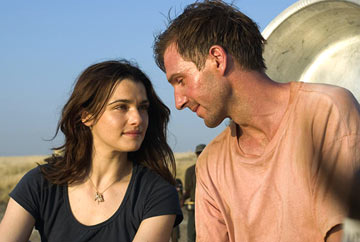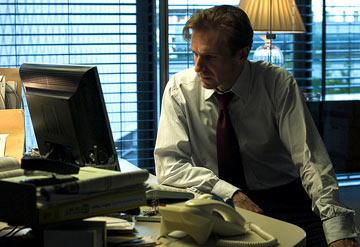

Movie fans, especially people older than their teens, can finally rejoice. In a summer full of dull, unoriginal dreck aimed at teenagers winds its way down, The Constant Gardener stands out. It is a smart movie with a strong opinion that people may or may not agree with. It has good acting and delves deep into what motivates its characters to act the way they do. The pacing is a bit slower than the typical mindless action movie, but only because it builds to something bigger as the film progresses. And unlike National Treasure and Sahara, The Constant Gardener (based on the novel by John Le Carre) is a film where its protagonists actually follows clues to solve a mystery rather than have things handed to him.
The murder of Tessa Quayle (Rachel Weisz, Constantine, Envy) spurs low-level British diplomat Justin Quayle (Ralph Feinnes, Maid in Manhattan, Red Dragon) out of his sense of complacency. Quayle is stationed in Kenya. He met Tessa shortly before his assignment, and the two quickly married. It's an odd marriage, as Tessa's politics lean far to the left and focus on activism. She is working on something in Kenya with her friend Dr. Arnold Bluhm (Hubert Kounde, The Price of Forgiveness, My Father and I) , but Quayle does not know any specific details. Tessa and Bluhm died in a car accident in a remote section of Kenya used often as a resort. People suspect that the two were having an affair, but the more that Quayle looks into the things, the less things make sense.
Director Fernando Meirelles (City of God, Palace II) and adapter Jeffrey Caine (Rory O'Shea Was Here) constantly flash back to shed additional light on the relationship between Quayle and Tessa. They do this to make things a bit more suspenseful (by teasing out relevant facts) and to keep the audience grounded with the relationship. Tessa was pregnant and about to give birth. Her death was devastating to Quayle. Feinnes plays a broken man, with nothing left to connect him with the world. The only way he will be at peace is to figure out why Tessa died. Weisz's constant presence serves as a reminder to the audience that Quayle is in profound grief.
And Feinnes does a grand job of slowly shifting his emotions. At the beginning of the film, he is a mere cog in a huge diplomatic machine. He seems more at ease in his garden than speaking with people. Grief gives way to unease, as various clues point to something larger and more sinister. As he uncovers more, his emotions change to rage. He wants to make sure the people behind his wife's death are brought to justice. The shift is gradual, and Feinnes handles is believably. This is also one of Weisz's better roles in a while (mostly because she's recently been in more mainstream, dumber work). Weisz is passionate about her political beliefs, which often run counter to Quayle's. Yet, she is just as passionate in her love for her husband. However, their marriage is complex. It is the secrets that Tessa keeps from Quayle that impel him forward. The other characters are wrapped in shades of ambiguity. It's hard to pinpoint whether they are "good" or "bad." It's hard to predict what Danny Huston (The Aviator, Birth) or Pete Postlewaithe (Dark Water, The Shipping News) will do, only because they are complex characters. It is the fact that the characters in The Constant Gardener can think and make real decisions, as well as the compelling dual story of love lost and corporate conspiracy, that make this film one of the better one thus far this year.